- Home
- Jennifer Donnelly
Stepsister Page 19
Stepsister Read online
Page 19
“Please, madame. It’s only four livres. I’ve worked very hard for you.”
Avara stopped counting. She looked at Isabelle aghast. “You’re not asking me for the money, are you?”
“I will pay you back.”
“Absolutely not,” Madame said. “It’s not just the four livres, you know. You’ve already put me in the poorhouse feeding that old nag of yours, Martin. Another horse will bankrupt me.”
She said more, but Isabelle had stopped listening. She crossed the room and knelt by Tantine.
“Please, Tantine. I beg you,” she said.
The old woman put her knitting down. She took Isabelle’s dirty hands in hers. “Child, you said this creature was sold to the slaughter yard because he is unmanageable, no? What if he were to throw you? I could never live with the guilt. An unruly stallion is not a suitable animal for a young lady.”
Isabelle saw that there would be no help for her here. She rose and started for the door.
Tantine arched an eyebrow. “Where are you going?” she asked.
“To the Château Rigolade. To see the marquis. I thought he might lend me—”
“No. I forbid it,” Tantine said sharply.
“But—”
Tantine held up a hand, silencing her. “If you will not consider your own reputation, Isabelle, at least consider my family’s. As long as you reside here, you are not to set foot near the Château Rigolade.”
“Indeed!” Madame chimed in.
Isabelle lowered her head, devastated. “Yes, Tantine,” she said.
“Instead of worrying about horses, worry about cabbages. They are not going to harvest themselves,” Madame scolded. “See that the wagon is filled up again for tomorrow.”
Isabelle left the house and drove the wagon out to the fields. All the way there, she racked her brain. There had to be a way to get the money. She refused to give up. By the time she’d unhitched Martin and had led him back to the barn, her head was high again. Her eyes were glinting. As she put him in his stall, she gave him an extra helping of oats.
“Eat up, Martin, you’ll need your strength. We have a job to do tonight,” she told him.
Martin pricked up his ears; he liked a bit of intrigue. Much more than he liked pulling cabbage wagons.
Isabelle had come up with an idea; it was desperate and risky. She would have to get her sister’s help to pull it off. Hugo’s, too, which would be more difficult. But he owed her; she’d said nothing about his errand.
As she brushed Martin, Tanaquill’s words, spoken when they’d met in the Wildwood, came back to her. They rang out so clear, so true, it was as if the fairy queen was standing right next to her. Find the pieces of your heart. Not someone else’s . . .
Nero was a piece of her heart. She knew this with an unshakable certainty. When she’d ridden him, she’d been braver than she ever thought she could be. It terrified her to admit this, because she knew if she lost him again, it would kill her.
“Nero is not going to die. We won’t let him,” Isabelle said, patting Martin’s neck. “Get some rest, old man. We leave after dark.”
“How hot does a fire have to be to melt gold?” Isabelle asked.
“Very,” Hugo replied.
“One thousand nine hundred forty-eight degrees Fahrenheit,” said Tavi. “One thousand sixty-four Celsius.”
“Had that right on the tip of your tongue, didn’t you?” Hugo said.
“What should I have on the tip of my tongue? The words to some silly love song? A recipe for meatballs?”
“Yes,” Hugo said. “Both of those would be good things for you to know.”
Tavi rolled her eyes.
The three were walking down the lonely stretch of road that led from the LeBenêts’ farm to the Maison Douleur in the darkness. Isabelle had decided to search the ruins of her old home in the hopes of finding something of value. She knew she could not move charred beams and heavy stones alone and had begged Tavi and Hugo to help her. Tavi had agreed because she knew how much Nero meant to Isabelle. Hugo had because he’d made Isabelle promise that if she found more than one valuable thing, she would use it to find somewhere else to live.
Isabelle had owned a few pieces of jewelry. So had Tavi. Maman had owned many. When the Maison Douleur burned, they’d all assumed that the fire had destroyed them, but they’d never actually looked. Now Isabelle was hoping that she could unearth a necklace, or perhaps a silver serving spoon, a gold coin—anything that she could barter for Nero’s life.
Martin trailed behind them on a lead. No one was riding him. He would need all his strength for what was to come. Hugo had a heavy coil of rope on one shoulder. He and Tavi were both carrying lanterns.
“Did you ever think about making sauerkraut with your cabbage?” Tavi asked. “That way you could have something to sell at the market in the winter.”
“Did you ever think of leaving things just the way they are?”
“No. Never. You can’t make wonderful discoveries that way.”
Hugo snorted laughter. “Like the sweaty dead dog?”
Tavi shot him a look. “Whatever happened to it, anyway?” she asked.
“It’s still in a box in the wagon, under the back seat. I haven’t found a good place to chuck it yet. Someplace where it won’t kill someone. I’m hoping to find a bubbling lava pit one day. Or a dragon’s cave. Or the gates of hell.”
Tavi looked at the side of his face. “You’re funny, Hugo. Who knew?”
Hugo was silent for a moment; then he said, “Odette. She knows.”
“Odette from the village?” Tavi asked.
Hugo nodded.
“How does she know you’re funny?” asked Isabelle. She remembered seeing him helping Odette across the street earlier at the market.
“Because we’re in love. And we want to get married.”
Tavi and Isabelle stopped dead. Martin did, too. But Hugo kept walking, his hands clenched.
“Does your mother know?” Tavi asked, running to keep up with him. Isabelle and Martin trotted after her.
“That I’m funny?” Hugo asked.
“No, Hugo,” Tavi said. “About Odette.”
“Yes. I told her. A year ago.”
“Then why haven’t you married her yet?” Isabelle asked, catching up.
“My mother won’t allow it,” Hugo said forlornly.
Isabelle and Tavi exchanged glances of disbelief. Never had Hugo spoken so many words at once, or with such emotion.
“Hugo …”
“Don’t make fun, Tavi. Don’t,” he warned.
Tavi looked stricken. “I—I wasn’t going to.”
“Odette practically runs the inn. She keeps all the reservations straight. She makes the best onion soup you’ve ever tasted. And her apple cake … I would fight the devil himself for a piece of it. But my mother says a blind girl can’t run a farm. She says she’ll be useless, just another mouth to feed. She only sees what Odette isn’t, not what she is.”
Tavi put a gentle hand on his back.
“This world, the people in it—my mother, Tantine—they sort us. Put us in crates. You are an egg. You are a potato. You are a cabbage. They tell us who we are. What we will do. What we will be.”
“Because they’re afraid. Afraid of what we could be,” Tavi said.
“But we let them do it!” Hugo said angrily. “Why?”
Tavi gave him a rueful smile. “Because we’re afraid of what we could be, too.”
A silence fell over them then, as deep and dark as the moonless night.
Hugo was the first to break it. “What am I going to do? Can one of you tell me?” he asked. “She’s everything to me.”
“I can’t believe you’re asking us,” Isabelle said. “I thought you hated us.”
“I do hate you. But I’m desperate and you’re smart.”
“Marry her anyway,” Tavi suggested.
“Live at her house,” Isabelle said.
“There’s no room for me th
ere. Her family lives in a little cottage behind the inn. She has so many brothers and sisters it’s bursting at the seams.”
“There has to be a way. We’ll think of something. We will,” Tavi said.
Hugo nodded. He mustered a smile. But Isabelle could see that he didn’t believe her.
They walked on down the road in silence, uncertain and aching. Hugo aching for Odette. Tavi aching for formulas and theorems. Isabelle aching to be pretty. Or so she told herself.
But alongside the ache, perhaps because of it, was a determination, too.
Neither Isabelle, Tavi, nor Hugo knew if any of them would ever be able to show the world what they were, not what they weren’t. They didn’t know if they’d be able to save their hearts from breaking.
But tonight, maybe, just maybe, they could save a horse. A difficult creature who didn’t know how to be anything but what he was.
They hoped for him, deep down inside. All three of them.
Because they didn’t dare hope for themselves.
Hugo let out a low whistle. He was standing at the top of the front steps to the Maison Douleur, holding his lantern out in front of him. The steps had survived the fire, but nothing else had.
Isabelle and Tavi were standing next to him.
It was much worse than Isabelle remembered. Parts of the house that had still been standing the morning after the fire had since collapsed. The roof, three of the walls, the floors and ceilings, had all crashed down. Only the back wall remained upright. Stone, mortar, and wooden beams lay tangled in treacherous, teetering piles.
“We’re going to have to move slowly or we’ll bring rubble down on our heads,” Hugo said.
That was not what Isabelle wanted to hear. They’d gotten a late start. Madame and Tantine had stayed up longer than usual; Hugo hadn’t been able to sneak out until eleven thirty. Isabelle had to be back at the slaughter yard with something of value by seven, they hadn’t even begun to search yet, and now Hugo was saying they’d have to go slow.
Fear chattered at her, telling her that there wasn’t enough time. That the rocks were too heavy to move, the beams too large. That even if she dug to the bottom of the ruins, she wouldn’t find a thing of value, that the flames had taken it all.
As she stood there, at a loss how to begin, or even where, a loose rock tumbled down off the back wall into a pile of debris with a loud crash. It made her jump. It felt as if the Maison Douleur was warning them off.
Isabelle thought of Nero, standing in the slaughter yard staring into the darkness. She walked back down the stairs, climbed into the remains of her home, and refused to listen.
“Hup, Martin! Hup, boy!” Hugo shouted, urging the horse on.
Martin leaned into the rope harness and pulled with all his might.
He was tired. They all were. They’d been searching for hours, crawling over charred debris with their lanterns, moving whatever stones they could by hand, and using Martin to move heavy beams, but they’d found nothing.
“Come on, Martin! Hup!”
Martin dug in, and the beam slid out of the rubble and across the grass. Hugo patted him and unknotted the rope.
“Anything?” he called out.
“No!” Isabelle shouted back.
Sighing, a weary Hugo turned Martin around and together they walked back to the ruins. Isabelle and Tavi were busy digging in what had once been their drawing room. Moving one thing often loosened something else. More than once, they’d had to jump out of the way of falling roof tiles or a chunk of lath.
Although no one knew it, the beam Hugo and Martin had just slid out into the yard had also destabilized debris. It had been supporting the pile of burned timbers Isabelle was picking around. Her back to the pile, she didn’t see it shudder, then start to slide.
But Hugo did. “Isabelle! Look out!” he shouted, lunging for her.
He grabbed her arm and yanked her out of the way. She stumbled and fell against him, knocking him off his feet. They both hit the ground. The timbers crashed down near them. The jagged edge of one caught Isabelle’s shoulder, slicing an ugly gash into it.
Tavi screamed. She clambered to Isabelle and Hugo and helped them up.
“That’s it. We’re finished here,” she said, her voice quavering. “I’m sorry we didn’t find anything. I’m sorry for Nero. But there’s nothing here. Oh my God, Isabelle. Look at your shoulder!”
Tavi made her sister leave the ruins and sit down under the linden tree. There, she pressed a handkerchief against her wound.
Isabelle didn’t want to sit. “I’m all right,” she said, taking the handkerchief from Tavi. “I’m going back. Just one more time …”
“No,” Tavi said. “You could’ve been killed. Hugo could’ve been. We’re leaving.”
Hugo had joined them. He lay down in the grass, spent. Tavi sat next to him. Isabelle reluctantly joined them.
“Are you all right?” Tavi asked him. He nodded, his eyes closed. “Thank you for saving Isabelle. I couldn’t bear it if anything happened to her. To either of you.” Her voice caught.
“It’s all right,” Hugo said. “We’re both fine.”
“No, it’s not all right. I thought you were both dead. Oh, Hugo, I … I shouldn’t have done it.”
“Done what?”
“Called you an idiot. In the dairy house the other day. I’m sorry. Mean is all I’ve got, you see, so I’m always trying to get better at it.”
Hugo gave her a tired smile. “You have more than mean, Tavi. A lot more. I’m sure if you lived a hundred years ago, you would’ve been the one who discovered that circles are round. Not Newton da Vinci.”
Had Isabelle’s attention not been entirely focused on the ruins, she might’ve seen that a bit of treasure had already been gleaned from the ashes—Tavi’s newfound readiness to apologize for bad behavior, Hugo’s willingness to speak sweet words instead of sullen ones. But Isabelle had only one thought in mind—saving Nero, and time was running out.
With a groan, Hugo stood. He picked up his rope, coiled it, and slipped it over his shoulder. “The sky’s starting to lighten,” he said. “My mother will be getting up soon. I better be in my bed when she comes to wake me.”
Tavi stood, too. She turned to Isabelle. “Come on, Iz. Get up. It’s time to go.”
Isabelle rose. Her hands were scraped raw, her shoulder was bleeding into the sleeve of her dress.
She looked at her sister and Hugo and Martin as they started down the drive, but instead of following them, she picked up her lantern and walked back into the ruins.
Despair swirled down on her like a thick fog, but she refused to give into it. Or to give up.
As she bent down to move a timber, she felt something tug at her hem. Certain she’d snagged her skirts on a nail, she looked down, ready to yank them free, and saw that it wasn’t a nail.
It was a mouse.
The creature’s tiny paws were sunk into Isabelle’s hem. She was hanging on to it with all her might; her back feet were half off the ground.
“Shoo!” Isabelle said. “I don’t want to step on you.”
But the mouse would not let go.
Her claws must be caught, Isabelle thought, reaching toward her to free her. But as she did, the mouse released the hem. She stood upright on her hind legs and squeaked.
Isabelle recognized the little creature. It was the same mother mouse she’d seen digging for lentils in the cracks between the hearthstones, the one for whom she’d left some cheese.
“Hello,” Isabelle said. “I don’t have any food for you. I wish I did. I—”
The mother mouse held up a claw, like a parent silencing a prattling child. She squeaked again. And then once more.
There was only a whisper at first. A low rustling, like a breeze whirling through the grass. But then it grew louder, more urgent, pushing in at Isabelle from all sides of the ruins.
Isabelle raised her lantern high and caught her breath, astonished. All around her, standing on stones, cro
uched on timbers, their whiskers twitching, their black eyes glinting in the light, their tails curled above them like question marks, were mice. Hundreds of them.
At another squeak from the mother mouse, they all disappeared into the ruins. Isabelle heard scrabbling, scritching, squeals, and yelps.
Mystified, she glanced at the mother mouse.
“Where did they go?” she asked. “What are they—”
With a look of annoyance, the mouse held up her paw again. She was listening intently, her large ears quivering.
Isabelle listened, too, but she didn’t know what she was listening for. She looked up. The stars were fading. The darkness was thinning. She had little time left.
And then a series of shrill calls rang out from the ruins. The mother mouse squeaked excitedly, hopping from foot to foot. She waved Isabelle close and pointed.
Isabelle put her lantern down and knelt on the ground, the better to see what the mouse was pointing at. As she did, another mouse, brawny and tall, emerged from the ruins. He was wearing something on his head. It looked like a crown.
“Is he your king?” Isabelle asked, completely perplexed now. “You want me to meet your king?”
Other mice reappeared from the ruins. They responded to Isabelle’s question with strange little noises that sounded like laughter. The mother beckoned the large mouse over. He eyed Isabelle warily and shook his head. The mother mouse stamped her foot. The large mouse came.
He took off his crown with both paws and held it out to Isabelle. Not sure what else to do, Isabelle took it from him, then held it up to her lantern. A small cry escaped her as she saw that it wasn’t a crown, not at all.
It was a gold ring.
Isabelle’s heart flooded with gratitude. For a moment, she couldn’t speak.
She recognized the ring. Maman had given it to her. The band was thin. The stone—an amethyst—was small. Still, it had to be worth four livres. Maybe more.
“Thank you,” she finally managed to say.

 Rogue Wave
Rogue Wave Waterfire Saga, Book One: Deep Blue (A Waterfire Saga Novel)
Waterfire Saga, Book One: Deep Blue (A Waterfire Saga Novel)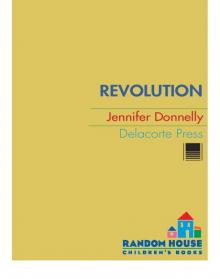 Revolution
Revolution The Wild Rose
The Wild Rose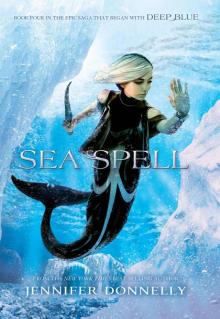 Waterfire Saga (4 Book Series)
Waterfire Saga (4 Book Series)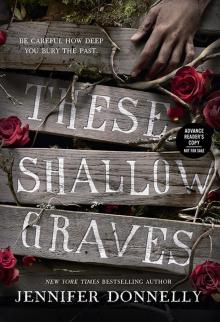 These Shallow Graves
These Shallow Graves Beauty and the Beast: Lost in a Book
Beauty and the Beast: Lost in a Book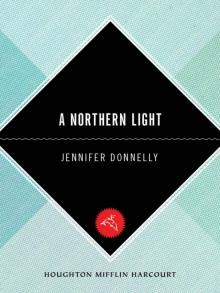 A Northern Light
A Northern Light The Tea Rose
The Tea Rose Waterfire Saga, Book Three: Dark Tide: A Deep Blue Novel
Waterfire Saga, Book Three: Dark Tide: A Deep Blue Novel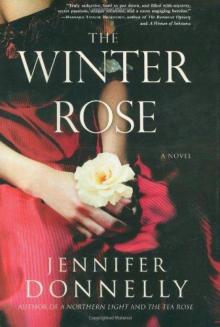 The Winter Rose
The Winter Rose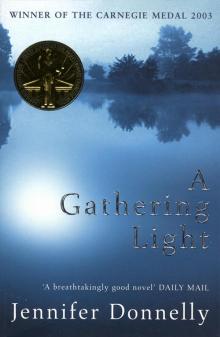 A Gathering Light
A Gathering Light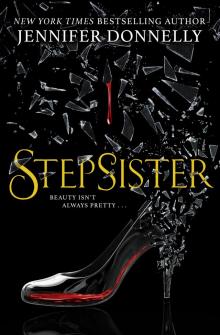 Stepsister
Stepsister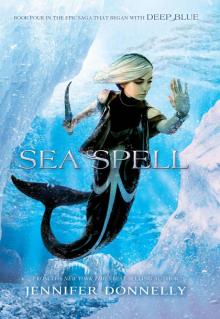 Waterfire Saga, Book Four: Sea Spell: Deep Blue Novel, A
Waterfire Saga, Book Four: Sea Spell: Deep Blue Novel, A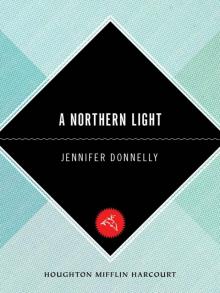 Northern Light
Northern Light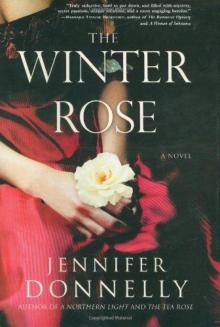 Winter Rose, The
Winter Rose, The